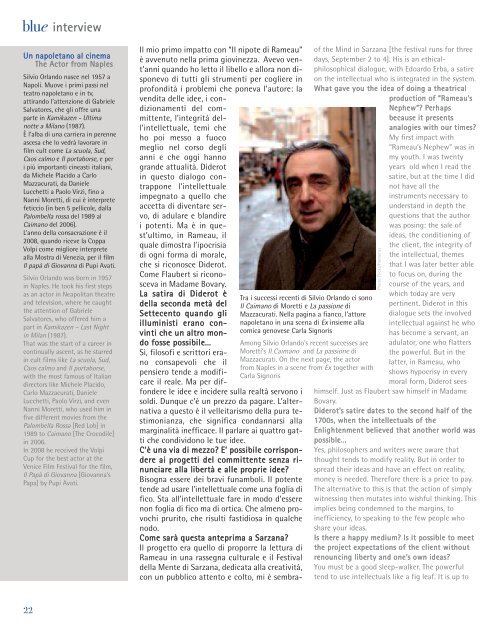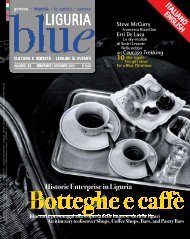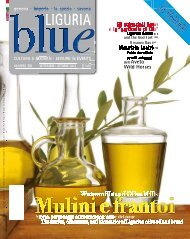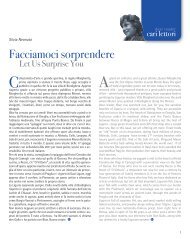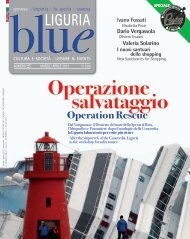You also want an ePaper? Increase the reach of your titles
YUMPU automatically turns print PDFs into web optimized ePapers that Google loves.
lue interview<br />
Un napoletano al cinema<br />
The Actor from Naples<br />
Silvio Orlando nasce nel 1957 a<br />
Napoli. Muove i primi passi nel<br />
teatro napoletano e in tv,<br />
attirando l’attenzione di Gabriele<br />
Salvatores, che gli offre una<br />
parte in Kamikazen - Ultima<br />
notte a Milano (1987).<br />
È l’alba di una carriera in perenne<br />
ascesa che lo vedrà lavorare in<br />
film cult come La scuola, Sud,<br />
Caos calmo e Il portaborse, e per<br />
i più importanti cineasti italiani,<br />
da Michele Placido a Carlo<br />
Mazzacurati, da Daniele<br />
Lucchetti a Paolo Virzì, fino a<br />
Nanni Moretti, di cui è interprete<br />
feticcio (in ben 5 pellicole, dalla<br />
Palombella rossa del 1989 al<br />
Caimano del 2006).<br />
L’anno della consacrazione è il<br />
2008, quando riceve la Coppa<br />
Volpi come migliore interprete<br />
alla Mostra di Venezia, per il film<br />
Il papà di Giovanna di Pupi Avati.<br />
Silvio Orlando was born in 1957<br />
in Naples. He took his first steps<br />
as an actor in Neapolitan theatre<br />
and television, where he caught<br />
the attention of Gabriele<br />
Salvatores, who offered him a<br />
part in Kamikazen – Last Night<br />
in Milan (1987).<br />
That was the start of a career in<br />
continually ascent, as he starred<br />
in cult films like La scuola, Sud,<br />
Caos calmo and Il portaborse,<br />
with the most famous of Italian<br />
directors like Michele Placido,<br />
Carlo Mazzacurati, Daniele<br />
Lucchetti, Paolo Virzì, and even<br />
Nanni Moretti, who used him in<br />
five different movies from the<br />
Palombella Rossa [Red Lob] in<br />
1989 to Caimano [The Crocodile]<br />
in 2006.<br />
In 2008 he received the Volpi<br />
Cup for the best actor at the<br />
Venice Film Festival for the film,<br />
Il Papà di Giovanna [Giovanna’s<br />
Papa] by Pupi Avati.<br />
22<br />
Il mio primo impatto con “Il nipote di Rameau”<br />
è avvenuto nella prima giovinezza. Avevo vent’anni<br />
quando ho letto il libello e allora non disponevo<br />
di tutti gli strumenti per cogliere in<br />
profondità i problemi che poneva l’autore: la<br />
vendita delle idee, i condizionamenti<br />
del committente,<br />
l’integrità dell’intellettuale,<br />
temi che<br />
ho poi messo a fuoco<br />
meglio nel corso degli<br />
anni e che oggi hanno<br />
grande attualità. Diderot<br />
in questo dialogo contrappone<br />
l’intellettuale<br />
impegnato a quello che<br />
accetta di diventare servo,<br />
di adulare e blandire<br />
i potenti. Ma è in quest’ultimo,<br />
in Rameau, il<br />
quale dimostra l’ipocrisia<br />
di ogni forma di morale,<br />
che si riconosce Diderot.<br />
Come Flaubert si riconosceva<br />
in Madame Bovary.<br />
La satira di Diderot è<br />
della seconda metà del<br />
Settecento quando gli<br />
illuministi erano convinti<br />
che un altro mondo<br />
fosse possibile…<br />
Sì, filosofi e scrittori erano<br />
consapevoli che il<br />
pensiero tende a modificare<br />
il reale. Ma per dif-<br />
fondere le idee e incidere sulla realtà servono i<br />
soldi. Dunque c’è un prezzo da pagare. L’alternativa<br />
a questo è il velleitarismo della pura testimonianza,<br />
che significa condannarsi alla<br />
marginalità inefficace. Il parlare ai quattro gatti<br />
che condividono le tue idee.<br />
C’è una via di mezzo? E’ possibile corrispondere<br />
ai progetti del committente senza rinunciare<br />
alla libertà e alle proprie idee?<br />
Bisogna essere dei bravi funamboli. Il potente<br />
tende ad usare l’intellettuale come una foglia di<br />
fico. Sta all’intellettuale fare in modo d’essere<br />
non foglia di fico ma di ortica. Che almeno provochi<br />
prurito, che risulti fastidiosa in qualche<br />
nodo.<br />
Come sarà questa anteprima a Sarzana?<br />
Il progetto era quello di proporre la lettura di<br />
Rameau in una rassegna culturale e il Festival<br />
della Mente di Sarzana, dedicata alla creatività,<br />
con un pubblico attento e colto, mi è sembra-<br />
Tra i successi recenti di Silvio Orlando ci sono<br />
Il Caimano di Moretti e La passione di<br />
Mazzacurati. Nella pagina a fianco, l'attore<br />
napoletano in una scena di Ex insieme alla<br />
comica genovese Carla Signoris<br />
Among Silvio Orlando’s recent successes are<br />
Moretti’s Il Caimano and La passione di<br />
Mazzacurati. On the next page, the actor<br />
from Naples in a scene from Ex together with<br />
Carla Signoris<br />
of the Mind in Sarzana [the festival runs for three<br />
days, September 2 to 4]. His is an ethicalphilosophical<br />
dialogue, with Edoardo Erba, a satire<br />
on the intellectual who is integrated in the system.<br />
What gave you the idea of doing a theatrical<br />
production of “Rameau’s<br />
Nephew”? Perhaps<br />
because it presents<br />
analogies with our times?<br />
My first impact with<br />
“Rameau’s Nephew” was in<br />
my youth. I was twenty<br />
years old when I read the<br />
satire, but at the time I did<br />
not have all the<br />
instruments necessary to<br />
understand in depth the<br />
questions that the author<br />
was posing: the sale of<br />
ideas, the conditioning of<br />
the client, the integrity of<br />
the intellectual, themes<br />
that I was later better able<br />
to focus on, during the<br />
Photo Flickr/Homerus<br />
course of the years, and<br />
which today are very<br />
pertinent. Diderot in this<br />
dialogue sets the involved<br />
intellectual against he who<br />
has become a servant, an<br />
adulator, one who flatters<br />
the powerful. But in the<br />
latter, in Rameau, who<br />
shows hypocrisy in every<br />
moral form, Diderot sees<br />
himself. Just as Flaubert saw himself in Madame<br />
Bovary.<br />
Diderot’s satire dates to the second half of the<br />
1700s, when the intellectuals of the<br />
Enlightenment believed that another world was<br />
possible…<br />
Yes, philosophers and writers were aware that<br />
thought tends to modify reality. But in order to<br />
spread their ideas and have an effect on reality,<br />
money is needed. Therefore there is a price to pay.<br />
The alternative to this is that the action of simply<br />
witnessing then mutates into wishful thinking. This<br />
implies being condemned to the margins, to<br />
inefficiency, to speaking to the few people who<br />
share your ideas.<br />
Is there a happy medium? Is it possible to meet<br />
the project expectations of the client without<br />
renouncing liberty and one’s own ideas?<br />
You must be a good sleep-walker. The powerful<br />
tend to use intellectuals like a fig leaf. It is up to


